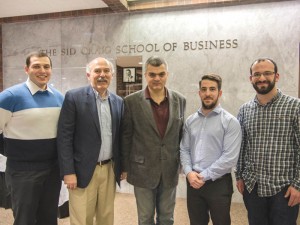
Photo: Hourig Attarian
Michael Rettig
Staff Writer
The vehement denial of the Armenian Genocide on the part of the government of the Republic of Turkey has led to the falsification and distortion of history. Scholarship and the use of primary sources are vital tools in countering this misinformation. Studying the accounts of politicians, missionaries, and soldiers and how they corroborate with each other, helps to contribute to the historic accuracy of what took place in 1915. On Wednesday, February 17, Ara Sarafian, founder of the London based-Gomidas Institute, spoke about one such example of an important primary source in his lecture, “Ambassador Morgenthau’s Story.”
Sarafian has been publishing primary source material through the Gomidas Institute to better familiarize people with the details of the Genocide. According to Sarafian, scholarship is the most appropriate response to Genocide denial.
“You [the public] depend on the scholars doing their work, but you also need to be well read as the basis of your activism. There is a clear role to be played by public intellectuals.” Sarafian has recently republished Ambassador Morgenthau’s Story with an added introduction to better combat denialist historians. According to Sarafian, Morgenthau’s story is not only important for its insight into the Armenian Genocide, but it can be used to study the history of denial surrounding the event.
According to Sarafian, Morgenthau’s story is an espe-cially crucial piece of evidence because of who Morgenthau was and the accessibility of his account. Morgenthau was appointed ambassador to the Ottoman Empire by President Woodrow Wilson in 1913. Because the Americans entered the war in 1917, much later than the French and British, the American missionaries and diplomats were able to remain in the Ottoman Empire for a longer period. During the Genocide, Morgenthau, upon receiving hundreds of reports from the American consuls and missionaries based in the provinces, advocated for the Armenians. He forwarded these reports to the State Department and discussed them with both Turkish and German officials. The Armenian issue dominated his conversation and attention during the war.
Morgenthau’s German-Jewish background made him well suited to the task, as he was able to understand the language of Turkey’s ally and his Jewish ethnicity made him sympathetic to disenfranchised minorities. “Ambassador Morgenthau could have ignored what was going on because the Armenians, who were the objects of mass murder and destruction, were not American citizens. It would have been easy for him to have dealt with it in a few sentences and put it aside,” stated Sarafian. “It is quite remarkable that, starting in April 1915, the Ambassador of a neutral United States was preoccupied with saving the lives of Armenian subjects of the Ottoman Empire.” Morgenthau was able to use his prior training as a lawyer to advocate for their cause. “He knew the importance of evidence and how to gather it and how to use it.”
Despite this, Morgenthau’s account has been called into question by denialist historians such as Dr. Heath Lowry (formerly of Princeton University). Lowry claimed that Morgenthau was fed false information by his Armenian aides. Sarafian attributed this criticism as a result of a prejudiced attitude in which Armenians are considered inherent liars. Lowry similarly tried to discredit Morgenthau by claiming that because his accounts were written in 1918 when the United States was at war, they were nothing more than “wartime propaganda.” He claimed that Morgenthau’s earlier private papers and diaries told a much different story. Upon researching Morgenthau’s private papers, Sarafian realized that it was Lowry who had fabricated his information. Morgenthau’s wartime memoir was actually heavily based on his diaries and papers from 1915. “It was a good example for me to see how history can be turned on its head if you are not able to argue your case well while your opponent is.”
The republished edition of Morgenthau’s story includes an introduction by Sarafian which stresses the direct link between Morgenthau’s memoir and his diary and papers from 1915. This introduction bolsters the historical accuracy of Ambassador Morgenthau’s Story against those who would try to distort history.
Sarafian concluded his lecture by emphasizing the importance of good scholarship in countering falsified histories. “We have at least 25 years of systematic Turkish denial. The Turkish position is actually very weak; Ambassador Morgenthau’s Story is only one of those cases. This is why we need scholarly refutation as the basis for dialogue. The way you win arguments is not by shouting people down, but by actually knowing what that person says, why they are wrong, and by arguing with the evidence.”
 Hye Sharzhoom Armenian Action
Hye Sharzhoom Armenian Action